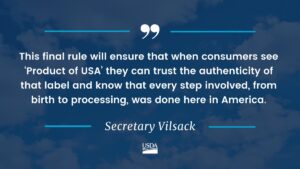A bipartisan group of former leaders of America's major agricultural commodity associations and biofuels organizations, farmer leaders, and former senior USDA officials sent congressional ag leaders a letter on Tuesday…
‘Product of USA’ label restricted to US-grown meat, poultry and eggs
Reuters’ Leah Douglas reported that “the administration of U.S. President Joe Biden on Monday finalized a rule requiring meat, poultry, or eggs labeled as a U.S. product to come from animals born, raised, slaughtered, and processed in the country.”
“The rule, proposed last March, is a victory for U.S. ranchers who argued for years that use of the voluntary label by companies who raised animals abroad and only slaughtered or processed them in the U.S. was misleading and disadvantaged domestic producers,” Douglas reported. “‘This final rule will ensure that when consumers see ‘Product of USA’ they can trust the authenticity of that label and know that every step involved, from birth to processing, was done here in America,’ said Agriculture Secretary Tom Vilsack in a statement.”

New Rule Details
Douglas reported that “producers using ‘Product of USA’ or ‘Made in the USA’ labels will need to comply with the rule by Jan. 1, 2026.”
The new rule is a change from current policy, Food Safety News’ Dan Flynn reported, that “allows imported meat to bear a ‘Product of U.S.A.’ label provided it passes through a USDA-inspected plant. It is a heavily exploited loophole that has allowed multinational corporations to import meat, repackage it, and pass it off as a higher-quality product raised by U.S. farmers and ranchers. Monday’s announcement closes that loophole.”
The Northern Ag Network reported Monday that “Product of USA” or “Made in the USA” will “remain eligible for generic label approval, meaning it would not need to be pre-approved by USDA’s Food Safety and Inspection Service (FSIS) before it can be used on regulated product, but would require the establishment to maintain documentation on file to support the claim. The final rule also allows the use of other voluntary U.S. origin claims on meat products sold in the marketplace. These claims will need to include a description on the package of the preparation and processing steps that occurred in the United States upon which the claim is made.”
Farm and Ag Groups Applaud Decision
Flynn reported that farm and ranch groups — including the U.S. Cattlemen’s Association, Farm Action and American Grassfed Association — cheered the finalized rule on Monday.
Flynn reported that Justin Tupper, president of the U.S. Cattlemen’s Association said “If it says ‘Made in the USA,’ then it should be from cattle that have only known USA soil. Consumers have the right to know where their food comes from, full stop.”
“‘Truthful labels protect consumers and keep the playing field fair,’ said Joe Maxwell, president and co-founder of Farm Action,” according to Flynn. “‘After a five-year fight, we’re pleased to see the USDA stepping up to stop the cheaters picking the pockets of America’s farmers and ranchers.’”
Canadian Concerns
While U.S. farm and ranch groups largely cheered the final rule, The Canadian Press reports that “Canada’s federal government as well as organizations representing some of the nation’s beef producers warn a decision south of the border about “Product of USA” labels on meat, poultry and eggs could disrupt supply chains.”
“Canada’s Agriculture Minister, Lawrence MacAulay, and International Trade Minister Mary Ng say in a joint statement they’re disappointed the rule does not appear to take into account concerns they’ve raised related to the ‘unique and important trading relationship’ between the two countries,” the Canadian Press reported. “They say the ‘meat and livestock sectors in Canada and the United States work closely together’ and that Canada intends to raise the issue during the agriculture ministers trilateral meeting with United States and Mexico scheduled to take place in Colorado later this month.”





